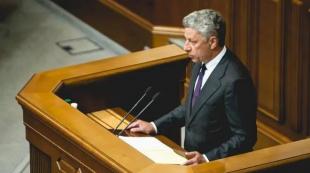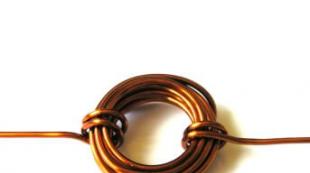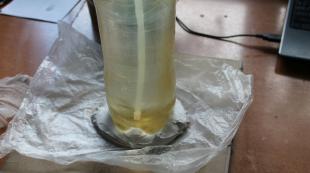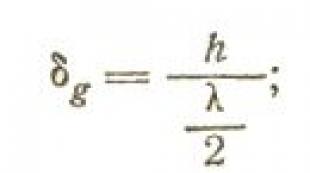Mikhail Sholokhov Prize. How Mikhail Sholokhov received the Nobel Prize in Literature
"What else can justify
the life and work of each of us,
if not the trust of the people, not the recognition that
what do you give to the people ...,
Motherland with all its strength and abilities.
M. A. Sholokhov.
On December 10, 1965, the Nobel Prize in Literature was awarded to Sholokhov M. A. (1905 - 1984) in Stockholm
Russian writer Mikhail Aleksandrovich Sholokhov was born on the Kruzhilin farm of the Cossack village of Vyoshenskaya in the Rostov region, in southern Russia. In his works, the writer immortalized the Don River and the Cossacks who lived here and defended the interests of the tsar in pre-revolutionary Russia and opposed the Bolsheviks during the civil war.
The idea of Sholokhov as the most worthy candidate for the Nobel Prize was first heard in the foreign press, in particular in Swedish newspapers, in 1935, when “ Quiet Don”was not yet completed, but its author was already known as “world famous”, “world writer”, and the novel was “Soviet“ War and Peace ””. Completed in 1940, "Quiet Flows the Don" could not be considered by the Swedish Academy as a work worthy of the Nobel Prize for political reasons.

Medal awarded to Nobel laureate
In 1964, Jean-Paul Sartre refused the Nobel Prize, explaining this, among other things, by his personal regret that Sholokhov was not awarded the prize. It was this gesture of Sartre that predetermined the choice of the laureate in 1965.

Swedish Academy building
Despite the apparent non-engagement of the Nobel Prize, dictated by the philanthropic instructions of Nobel himself, many "left" political forces still see obvious politicization and some Western cultural chauvinism in awarding the prize.
It is hard not to notice that the vast majority of Nobel laureates come from the USA and European countries (more than 700 laureates), while the number of laureates from the USSR and Russia is much smaller. Moreover, there is a point of view that most of the Soviet laureates were awarded the prize only for criticizing the USSR.
But this is a completely different story, let's digress from politics and look at photos from the award ceremony for Sholokhov M.A. on December 10, exactly 50 years ago, as well as other pictures of the writer and everything connected with the name of the Nobel laureate:

Mikhail Sholokhov in the building of the Swedish Academy before the award ceremony.

The Sholokhovs before the Nobel Prize.

Nobel laureates, Stockholm, December 1965. Far right - Mikhail Sholokhov
In the evening of the same day, a banquet was held in honor of the Nobel laureates, which was a record in all respects. In the hall designed for 850 guests, tables were set for 1292 people. The holiday was served by 200 waiters, cooks and other staff.
2000 red carnations and mimosa. Gold candlesticks served as table decoration. On the table were specially prepared for smokers packages with cigarettes and matches with a portrait of A. Nobel. Sholokhov had a special glass and Russian cigarettes.
The royal family and Nobel Prize winners traditionally had to eat on a gold service.
The dinner was accompanied by melodies by Strauss, Tchaikovsky, Offenbach, Gluck, Koch, Frimm, Janikhira.

Sholokhov at the Soviet Embassy in Stockholm

In his speech during the awards ceremony, the writer said that his goal was "to exalt a nation of workers, builders and heroes." Sholokhov is the only Soviet writer who received the Nobel Prize with the consent of the USSR authorities.

The ceremony of awarding the Nobel Prize to M. A. Sholokhov on December 10, 1965 (frames from a documentary film about the writer)

M.A. Sholokhov and Swedish King Gustav Adolf at the Nobel Prize ceremony
Gustav Adolf VI, who presented the award to the Soviet writer, called him "one of the most outstanding writers of our time." Sholokhov did not bow to the king, as prescribed by the rules of etiquette. Some sources claim that he did this intentionally with the words: “We Cossacks do not bow to anyone. Here in front of the people - please, but I will not be in front of the king ... "

Mikhail Aleksandrovich during the presentation of the Nobel Prize in 1965
Sholokhov's speech made a great impression on the public. The difficulty of understanding Russian speech for the audience was removed by the fact that envelopes with the translation of the laureate's speech were distributed in advance to those invited to the celebration.
I especially remember the final words of his speech: “I would like my books to help people become better, become purer in soul, awaken love for a person ... If I succeeded to some extent, I am happy.”
Nobel Prize in Literature, 1965
Russian writer Mikhail Aleksandrovich Sholokhov was born on the Kruzhilin farm of the Cossack village of Vyoshenskaya in the Rostov region, in southern Russia. In his works, the writer immortalized the Don River and the Cossacks who lived here and defended the interests of the tsar in pre-revolutionary Russia and opposed the Bolsheviks during the civil war.
His father, a native of the Ryazan province, sowed bread on rented Cossack land, was a clerk in charge of a steam mill, and his mother, a Ukrainian, the widow of a Don Cossack, endowed by nature with a lively mind, learned to read and write in order to correspond with her son when he went to study in Voronezh.
Sh.'s studies were interrupted by the revolution of 1917 and the civil war. After graduating from four classes of the gymnasium, he joined the Red Army in 1918 - and this despite the fact that many Don Cossacks joined the White Army, which fought against the Bolsheviks. The future writer first served in the logistics unit, and then became a machine gunner and participated in bloody battles on the Don. From the first days of the revolution, Sh. supported the Bolsheviks and advocated Soviet power. In 1932 he joined the Communist Party, in 1937 he was elected to the Supreme Soviet of the USSR, and two years later - a full member of the USSR Academy of Sciences. In 1956, Sh. spoke at the XX Congress of the CPSU, and in 1959 he accompanied the Soviet leader N.S. Khrushchev on his trips to Europe and the USA. In 1961, Mr.. Sh. became a member of the Central Committee of the CPSU.
In 1922, when the Bolsheviks finally took power into their own hands, Sh. came to Moscow. Here he took part in the work of the Young Guard literary group, worked as a loader, handyman, clerk. In 1923, his first feuilletons were published in the newspaper Yunosheskaya Pravda, and in 1924, in the same newspaper, the first story, “The Mole,” was published.
In the summer of 1924, Sh. returned to the village of Vyoshenskaya, where he lived, almost without a break, for the rest of his life. In 1925, a collection of feuilletons and stories of the writer about the civil war under the title "Don stories" was published in Moscow. In The History of Soviet Literature, the critic Vera Aleksandrova writes that the stories in this collection impress with "juicy descriptions of nature, rich speech characteristics of the characters, lively dialogues", noting, however, that "already in these early works it is felt that "Sholokhov's epic talent" is not fits within the narrow framework of the story.
From 1926 to 1940, Mr.. Sh. working on "Quiet Don", a novel that brought the writer worldwide fame. "Quiet Don" was printed in the Soviet Union in parts: the first and second volumes were published in 1928...1929, the third - in 1932...1933, and the fourth - in 1937...1940. In the West, the first two volumes appeared in 1934, and the next two in 1940.
The main, most famous novel by Sh. "Quiet Don" is an epic story about the First World War, revolution, civil war, about the attitude of the Cossacks to these events. One of the main characters of the novel, Grigory Melekhov, a hot-tempered, independent-minded Cossack who bravely fought the Germans on the fronts of the First World War, and then, after the overthrow of the autocracy, faced with the need to make a choice, fights first on the side of the Whites, then on the side of the Reds and in in the end it turns out to be in the "green" detachment. After several years of war, Gregory, like millions of Russian people, found himself spiritually devastated. Melekhov's duality, his inconsistency, mental turmoil make him one of the most famous tragic heroes of Soviet literature.
Initially, Soviet criticism reacted to the novel rather reservedly. The first volume of "The Quiet Flows the Don" caused criticism that it described the events of pre-revolutionary life from "alien", as it was then expressed, positions; the second volume did not suit official critics, since it differed, in their opinion, in an anti-Bolshevik orientation. In a letter to S. Stalin wrote that he did not agree with the interpretation of the images of two communists in the novel. However, despite all these criticisms, a number of well-known figures of Soviet culture, including Gorky, the founder of socialist realism, warmly supported the young writer and contributed in every possible way to the completion of the epic.
In the 30s. Sh interrupts work on The Quiet Don and writes a novel about the resistance of the Russian peasantry to forced collectivization, carried out in accordance with the first five-year plan (1928 ... 1933). Entitled "Virgin Soil Upturned", this novel, like "The Quiet Don", began to appear in periodicals when the first volume was not yet finished. Like The Quiet Don, Virgin Soil Upturned was met with hostility by official criticism, but members of the Central Committee of the Party considered that the novel gave an objective assessment of collectivization, and in every possible way contributed to the publication of the novel (1932). In the 40s...50s. the writer subjected the first volume to a significant revision, and in 1960 completed work on the second volume.
During World War II Sh. - war correspondent for Pravda, author of articles and reports on the heroism of the Soviet people; after the Battle of Stalingrad, the writer begins work on the third novel - the trilogy "They fought for the Motherland." The first chapters of the novel saw the light on the pages of Pravda already in 1943...1944, as well as in 1949 and 1954, however, the first volume of the trilogy was published as a separate edition only in 1958. The trilogy remained unfinished - in the post-war years the writer significantly reworks The Quiet Flows the Don, softens his rich language, tries to "whitewash" the bearers of the communist idea.
The fiftieth anniversary of Sh. was celebrated throughout the country, the writer received the Order of Lenin - the first of three. In the 50s. The publication of the second and final volume of Virgin Soil Upturned also begins, but the novel was released as a separate book only in 1960, about which it was suggested that the writer’s ideas diverge from the course of the Communist Party. The author nevertheless denied that he had ever been guided in his work by censorship considerations. From the end of the 50s. Sh writes very little.
In 1965, Sh: received the Nobel Prize in Literature "for the artistic power and integrity of the epic about the Don Cossacks at a turning point for Russia." In his speech during the awards ceremony W. said that his goal was to "extol the nation of workers, builders and heroes."
In the 70s. Alexander Solzhenitsyn, condemned by party members (including Sh.) for criticizing the socialist system, accused Sh. of plagiarism, of appropriating the works of another Cossack writer, Fyodor Kryukov, who died in 1920. Thus, Solzhenitsyn set in motion accusations that had place in the 20s. and became widespread in the 1970s. To date, however, such accusations remain unsubstantiated.
Sh. married in 1924, he had four children; the writer died in the village of Vyoshenskaya in 1984 at the age of 78.
Works Sh. remain popular with readers. By reworking The Quiet Flows the Don, he earned the approval of Soviet official criticism; as for Western experts, they consider the original version of the novel to be more successful. Thus, the American critic, a native of Russia, Mark Slonim compares "The Quiet Flows the Flows Flows the Don" with Tolstoy's epic "War and Peace", admitting, however, that Sh.'s book is "inferior to the ingenious creation of its great predecessor." “Sh., following in the footsteps of his teacher, combines biography with history, battle scenes with everyday life, the movement of the masses with individual psychology,” writes Slonim, “he shows how social cataclysms affect the fate of people, how political struggle leads to happiness or collapse."
According to the American researcher Ernest Simmons, the original version of The Quiet Flows the Don is not a political treatise. “This novel is not about politics, although it is oversaturated with politics,” Simmons wrote, “but about love. "Quiet Don" is a great and at the same time touching love story, perhaps the only real one. love story in Soviet literature. Noting that the heroes of the revised version of the novel “react to the events of 1917...1922. in the spirit of the communists of the 50s", Simmons opines that "the tendentiousness of the final version of the novel conflicts with its artistic integrity."
Slonim argued that Virgin Soil Upturned, which was considered weaker than The Quiet Don, "is not an ideological work ... it is a vividly written, traditional novel in which there is no element of edification." Simmons disagrees, calling "Virgin Soil Upturned" "artful Soviet propaganda carefully disguised in a fictional narrative." Pointing to the role of S. as a propagandist and apologist for socialism, the American literary critic Edward Brown, like other contemporary critics, pays tribute to the outstanding skill of S. - prose writer, author of "Quiet Flows the Don" in its original version. At the same time, Brown shares a common point of view, according to which W. "cannot be classified as one of the greatest writers, because he wrote too little and little of what he wrote reaches a high level."
Nobel Prize Laureates: Encyclopedia: Per. from English - M .: Progress, 1992.
© The H.W. Wilson Company, 1987.
© Translation into Russian with additions, Progress Publishing House, 1992.
Mikhail Aleksandrovich Sholokhov. Born on May 11 (24), 1905 on the Kruzhilin farm of the Donetsk District of the Don Cossack Region (now the Sholokhov District of the Rostov Region) - died on February 21, 1984 in the village of Vyoshenskaya, Rostov Region. Russian Soviet writer, screenwriter. Winner of the Nobel Prize in Literature (1965 - "for the artistic power and integrity of the epic about the Don Cossacks at a turning point for Russia"), the Stalin Prize (1941), the Lenin Prize (1960). Academician of the Academy of Sciences of the USSR (1939). Twice Hero of Socialist Labor (1967, 1980). Colonel (1943).
M. A. Sholokhov was born on May 11 (24), 1905 on the Kruzhilin farm of the village of Vyoshenskaya (now the Kruzhilin farm of the Sholokhov district of the Rostov region). At birth, he received a surname - Kuznetsov, which he changed in 1912 to the surname Sholokhov.
Father - Alexander Mikhailovich Sholokhov (1865-1925) - a native of the Ryazan province, did not belong to the Cossacks, was a "shibai" (cattle buyer), sowed bread on the purchased Cossack land, served as a clerk in a commercial enterprise of a farm scale, a manager at a steam mill and etc. Father's grandfather was a merchant of the third guild, originally from the city of Zaraysk, he moved with his big family to the Upper Donshchina in the mid-1870s, he bought a house with a farmstead and started buying up grain.
Mother - Anastasia Danilovna Chernikova (Chernyak) (1871-1942) - a Cossack by mother, daughter of a Little Russian peasant-migrant to the Don, a former serf of the Chernihiv province. For a long time she was in the service of the panorama Yasenevka. The orphan was forcibly married off by the landowner Popova, for whom she served, to the son of the stanitsa ataman Kuznetsov. But later she left her husband and went to Alexander Sholokhov. Their son Mikhail was born illegitimate and was recorded in the name of his mother's official husband, Kuznetsov. Only after the death of the official husband, in 1912, the boy's parents were able to get married, and Mikhail received the surname Sholokhov.
In 1910, the family left the Kruzhilin farm: Alexander Mikhailovich entered the service of a merchant in the village of Karginskaya. The father invited a local teacher, Timofey Timofeevich Mrikhin, to teach the boy to read and write.
In 1914 he studied for one year in Moscow in the preparatory class of the men's gymnasium.
From 1915 to 1918, Mikhail studied at the gymnasium in the city of Boguchar, Voronezh province. He graduated from the 4th grade of the gymnasium (sitting at the same desk with Konstantin Ivanovich Kargin, the future writer who wrote the story "Bakhchevnik" in the spring of 1930).
Before the German troops arrived in the city, according to Mikhail, he dropped out of school and went home to the farm.
In 1920, the family moved to the village of Karginskaya (after the advent of Soviet power), where Alexander Mikhailovich received the position of head of the procurement office of the Donprodkom, and his son Mikhail became the clerk of the village revolutionary committee.
In 1920-1921 he lived with his family in the village of Karginskaya. After completing the Rostov tax courses, he was appointed to the position of a food inspector in the village of Bukanovskaya, then joined the food detachment, participated in the food appraisal. In 1920, the food detachment, headed by 15-year-old (17.5-year-old) Sholokhov, was captured by Makhno. Then he thought that he would be shot, but he was released.
On August 31, 1922, while working as a stanitsa tax inspector, M.A. Sholokhov was arrested and was in the district center under investigation. He was sentenced to be shot.
“I led a cool line, and the time was cool; I was a helluva commissar, I was judged by the Revolutionary Tribunal for abuse of power ...- the writer later said. - For two days he waited for death ... And then they came and released him ... ". Until September 19, 1922, Sholokhov was in custody.
His father gave him a large bail and bailed him home until the trial. The parents brought a new metric to the court, and he was released as a minor (according to the new metric, the age decreased by 2.5 years). This was already in March 1923.
Then the “troikas” were judged, the sentences were severe. It was not difficult to believe that he was a minor, since Mikhail was short and looked like a boy. The execution was replaced by another punishment - the tribunal took into account his minority. He was given one year of corrective labor in a juvenile colony and sent to Bolshevo (near Moscow).
In Moscow, Sholokhov tried to continue his education, and also tried his hand at writing. However, it was not possible to enter the preparatory courses of the workers' faculty due to the lack of work experience and the direction of the Komsomol required for admission. According to one source, he worked as a loader, handyman, and bricklayer. According to others, he worked in the house management of the workers' housing-construction cooperative "Take an example!", which was chaired by L. G. Mirumov (Mirumyan).
He was engaged in self-education, took part in the work of the literary group "Young Guard", attended training sessions conducted by V. B. Shklovsky, O. M. Brik, N. N. Aseev. Joined the Komsomol. Active assistance in arranging the daily life of M. A. Sholokhov in Moscow and in advancing into the light of the first literary works his autograph was provided by a staff member of the ECU of the GPU, a Bolshevik with pre-revolutionary experience - Leon Galustovich Mirumov (Mirumyan), whom M. A. Sholokhov met in the village of Vyoshenskaya even before arriving in Moscow.
In September 1923, signed “Mikh. Sholokh" in the Komsomol newspaper "Youthful Pravda" ("Young Leninist") (now - "Moskovsky Komsomolets") a feuilleton was printed - "Trial", a month later a second feuilleton appeared - "Three" and then the third "Inspector".
In December 1923, M.A. Sholokhov returned to Karginskaya, and then to the village of Bukanovskaya, where he wooed Lydia Gromoslavskaya, one of the daughters of the former stanitsa ataman Pyotr Yakovlevich Gromoslavsky. But the former ataman said: "Take Mary, and I will make a man out of you." On January 11, 1924, M. A. Sholokhov married his eldest daughter, Maria Petrovna Gromoslavskaya (1901-1992), who worked as a teacher elementary school(in 1918, M. P. Gromoslavskaya, studied at the Ust-Medveditskaya gymnasium, the director of which at that time was F. D. Kryukov).
The first story "Beasts" (later "Food Commissar"), sent by M. A. Sholokhov in the almanac "Young Guard", was not accepted by the editors. December 14, 1924 in the newspaper "Young Leninist" published a story "Mole", who opened the cycle of Don stories: “Shepherd”, “Ilyukha”, “Foal”, “Azure Steppe”, “Family Man”, “Mortal Enemy”, “Two-wife”, etc. They were published in Komsomol periodicals, and then amounted to three collections published one after another: "Don stories", "Azure Steppe" (both - 1926) and "About Kolchak, nettles and other things" (1927).

After returning to Karginskaya, the eldest daughter Svetlana (1926, st. Karginskaya) was born in the family, then sons Alexander (1930-1990, Rostov-on-Don), Mikhail (1935, Moscow), daughter Maria (1938, Vyoshenskaya).
In 1958 he was awarded the Nobel Prize in Literature. In official Soviet circles, the award of the Pasternak Prize was perceived negatively and resulted in persecution of the writer, under the threat of deprivation of citizenship and expulsion from the USSR, Pasternak was forced to refuse the Nobel Prize.
In 1964, French writer and philosopher Jean-Paul Sartre refused the Nobel Prize in Literature. In his statement, in addition to personal reasons He also pointed out that the Nobel Prize had become "Western's highest cultural authority" and expressed regret that the prize had not been awarded to Sholokhov and that "the only Soviet work to win the prize was a book published abroad and banned in his native country." The refusal of the prize and Sartre's statement predetermined the choice of the Nobel Committee the following year.
In 1965, Sholokhov received the Nobel Prize in Literature "for the artistic power and integrity of the epic about the Don Cossacks at a turning point for Russia."
Sholokhov is the only Soviet writer who received the Nobel Prize with the consent of the USSR leadership. Mikhail Sholokhov did not bow to Gustavus Adolf VI, who presented the prize. According to some sources, this was done on purpose, with the words: “We, the Cossacks, do not bow to anyone. Here in front of the people - please, but I will not be in front of the king and that's it ... ".
Family of Mikhail Sholokhov:
Family of M. A. Sholokhov (April 1941). From left to right: Maria Petrovna with her son Misha, Alexander, Svetlana, Mikhail Sholokhov with Masha.
1923 December. Departure of M. A. Sholokhov from Moscow to the village of Karginskaya, to his parents, and together with them to Bukanovskaya, where his bride Lidia Gromoslavskaya and future wife Maria Petrovna Gromoslavskaya lived (since their father Pyotr Yakovlevich Gromoslavsky insisted on the marriage of M. A. Sholokhov on the eldest daughter Maria).
1924, January 11th. The wedding of M. A. and M. P. Sholokhov in the Church of the Intercession of the village of Bukanovskaya. Registration of marriage in the Podtelkovsky registry office (village Kumylzhenskaya).
1942, June. During the bombing of the village of Vyoshenskaya in the courtyard of the house of M. A. Sholokhov, the writer's mother died.
Bibliography of Mikhail Sholokhov:
"Mole" (story)
"Don stories"
Quiet Don
"Virgin Soil Upturned"
"They fought for their country"
"Destiny of Man"
"The Science of Hate"
"Word of the Motherland"
The problem of the authorship of texts published under the name of Sholokhov was raised as early as the 1920s, when The Quiet Don was first published. The main reason for the doubts of opponents in the authorship of Sholokhov (both then and at a later time) was the unusually young age of the author, who created, and in a very short time, such a grandiose work, and especially the circumstances of his biography: the novel demonstrates a good acquaintance with the life of the Don Cossacks , knowledge of many areas on the Don, the events of the First World War and civil war that took place when Sholokhov was a child and a teenager. To this argument, the researchers answer that the novel was not written by Sholokhov at the age of 20, but was written for almost fifteen years.
The author spent a lot of time in the archives, often communicating with people who later became the prototypes of the characters in the novel. According to some reports, the prototype of Grigory Melekhov was Kharlampy Yermakov, a colleague of Sholokhov's father, one of those who led the Vyoshensky uprising; he spent a lot of time with the future writer, talking about himself and what he had seen.
Another argument of opponents is the low, according to some critics, artistic level of Sholokhov's "Don Tales" that preceded the novel.
In 1929, on instructions, a commission was formed under the leadership of M. I. Ulyanova, which investigated this issue and confirmed the authorship of M. A. Sholokhov on the basis of the manuscripts of the novel provided by him. Subsequently, the manuscript was lost and was discovered only in 1999.
Until 1999, the main argument of supporters of the sole authorship of Sholokhov was considered to be a draft autograph of a significant part of the text of The Quiet Flows the Don (more than a thousand pages), discovered in 1987 and stored at the Institute of World Literature of the Russian Academy of Sciences. Supporters of Sholokhov's authorship have always argued that this manuscript testifies to the author's careful work on the novel, and the previously unknown history of the text explains the errors and contradictions in the novel noted by their opponents.
In addition, in the 1970s, the Norwegian Slavist and mathematician Geir Hjetso conducted a computer analysis of the indisputable texts of Sholokhov, on the one hand, and The Quiet Flows the Don, on the other, and came to the conclusion that Sholokhov was the author. A weighty argument was also that the action of the novel takes place in Sholokhov's native places, and many of the characters in the book have as their prototypes people whom Sholokhov knew personally.
In 1999, after many years of searching, the Institute of World Literature. A. M. Gorky RAS managed to find the manuscripts of the 1st and 2nd books of The Quiet Flows the Don that were considered lost. The three examinations carried out: graphological, textological and identification, certified the authenticity of the manuscript, its belonging to its time and with scientific validity solved the problem of the authorship of The Quiet Flows the Don, after which the supporters of Sholokhov's authorship considered their position unconditionally proven.
In 2006, a facsimile edition of the manuscript was released, giving everyone the opportunity to verify the true authorship of the novel. Nevertheless, a number of supporters of the version of plagiarism, based on their own analysis of the texts, remained unconvinced. It boils down to the fact that Sholokhov, apparently, found the manuscript of an unknown white Cossack and revised it, since the original would not have passed the Bolshevik censorship and, perhaps, the manuscript was still “raw”. Thus, Sholokhov created his own manuscript, but on someone else's material.
However, this position, based today only on assumptions, is convincingly refuted by the conducted examinations: the “rewritten” and the author’s texts are fundamentally different (in the author’s work, work on the manuscript, on artistic images is visible; the “rewritten” text or even “translated” largely loses any signs of the author's work, it is noticeable, often visually, obvious schematism and continuity of presentation, the absence of copyright corrections, and on the other hand, semantic and artistic unevenness, different quality of individual parts of the text). Based on the expertise, therefore, it can be said with sufficient certainty whether the text is original, artistically integral and has acquired independent value, or whether it has become a compilation of fragments and images of another work.
Ivan Alekseevich Bunin handed out the Nobel Prize to friends
In December 1933, the Paris press wrote: Without a doubt, I.A. Bunin - in recent years - the most powerful figure in Russian fiction and poetry», « the king of literature confidently and equally shook hands with the crowned monarch».
The Russian emigration applauded. In Russia, however, the news that a Russian emigrant received the Nobel Prize was treated very caustically. After all, Bunin negatively perceived the events of 1917 and emigrated to France. Ivan Alekseevich himself experienced emigration very hard, was actively interested in the fate of his abandoned homeland, and during the Second World War he categorically refused all contacts with the Nazis, having moved to the Maritime Alps in 1939, returning from where to Paris only in 1945.
Ivan Alekseevich Bunin. 1901
It is known that Nobel laureates have the right to decide how they will spend the money received. Someone invests in the development of science, someone in charity, someone in own business. Bunin, a creative person and devoid of "practical ingenuity", disposed of his bonus, which amounted to 170,331 crowns, completely irrationally.
The poet and literary critic Zinaida Shakhovskaya recalled: “ Returning to France, Ivan Alekseevich ... apart from money, began to organize feasts, distribute "allowances" to emigrants, and donate funds to support various societies. Finally, on the advice of well-wishers, he invested the remaining amount in some kind of “win-win business” and was left with nothing.».
Ivan Bunin is the first émigré writer to be published in Russia. True, the first publications of his stories appeared already in the 1950s, after the death of the writer. Some of his novels and poems were published in his homeland only in the 1990s.
Dear God, what are you for?
He gave us passions, thoughts and worries,
Thirst for business, glory and comfort?
Joyful cripples, idiots,
The leper is the happiest of all.
(I. Bunin. September, 1917)
Boris Pasternak refused the Nobel Prize
Boris Pasternak was nominated for the Nobel Prize in Literature "for significant achievements in modern lyric poetry, as well as for continuing the traditions of the great Russian epic novel" annually from 1946 to 1950. In 1958, last year's Nobel laureate Albert Camus again proposed his candidacy, and on October 23, Pasternak became the second Russian writer to be awarded this prize.
The writers' environment in the poet's homeland took this news extremely negatively, and already on October 27, Pasternak was unanimously expelled from the Writers' Union of the USSR, at the same time submitting a petition to deprive Pasternak of Soviet citizenship. In the USSR, Pasternak was associated with receiving the award only with his novel Doctor Zhivago.
The Literary Gazette wrote: “Pasternak received “thirty pieces of silver”, for which the Nobel Prize was used. He was rewarded for agreeing to play the role of bait on the rusty hook of anti-Soviet propaganda ... An inglorious end awaits the resurrected Judas, Doctor Zhivago, and his author, whose lot will be popular contempt ".

Boris Leonidovich Pasternak.
The mass campaign launched against Pasternak forced him to refuse the Nobel Prize. The poet sent a telegram to the Swedish Academy, in which he wrote: Because of the significance that the award awarded to me has received in the society to which I belong, I must refuse it. Do not take my voluntary refusal as an insult».
It is worth noting that in the USSR until 1989, even in the school curriculum on literature about Pasternak's work, there was no mention. The director Eldar Ryazanov was the first to decide to massively acquaint the Soviet people with the creative work of Pasternak. In his comedy "The Irony of Fate, or Enjoy Your Bath!" (1976) he included the poem "There Will Be No One in the House", transforming it into an urban romance, performed by the bard Sergei Nikitin. Later, Ryazanov included in his film "Office Romance" an excerpt from another poem by Pasternak - "To love others is a heavy cross ..." (1931). True, he sounded in a farcical context. But it is worth noting that at that time the very mention of Pasternak's poems was a very bold step.
Easy to wake up and see
Shake verbal rubbish from the heart
And live without clogging in the future,
All this is not a big trick.
(B. Pasternak, 1931)
Mikhail Sholokhov, receiving the Nobel Prize, did not bow to the monarch
Mikhail Aleksandrovich Sholokhov received the Nobel Prize in Literature in 1965 for his novel Quiet Flows the Flows Flows the Flows the Flows the Flows the Don and went down in history as the only Soviet writer to receive this award with the consent of the Soviet leadership. The diploma of the laureate says "in recognition of the artistic strength and honesty that he showed in his Don epic about the historical phases of the life of the Russian people."

Mikhail Aleksandrovich Sholokhov.
Gustav Adolf VI, who presented the award to the Soviet writer, called him "one of the most outstanding writers of our time." Sholokhov did not bow to the king, as prescribed by the rules of etiquette. Some sources claim that he did it intentionally with the words: “We, the Cossacks, do not bow to anyone. Here in front of the people - please, but I will not be in front of the king ... "

Bronze sculptures of literary characters from Mikhail Sholokhov's novel The Quiet Don on the embankment in the village of Veshenskaya.
Alexander Solzhenitsyn was deprived of Soviet citizenship because of the Nobel Prize
Alexander Isaevich Solzhenitsyn, the commander of the sound intelligence battery, who rose to the rank of captain during the war years and was awarded two military orders, was arrested in 1945 by front-line counterintelligence for anti-Sovietism. Sentence - 8 years in camps and life exile. He went through a camp in New Jerusalem near Moscow, Marfinskaya "sharashka" and the Special Ekibastuz camp in Kazakhstan. In 1956, Solzhenitsyn was rehabilitated, and since 1964 Alexander Solzhenitsyn devoted himself to literature. At the same time, he worked immediately on 4 major works: The Gulag Archipelago, The Cancer Ward, The Red Wheel and In the First Circle. In the USSR in 1964 they published the story "One Day in the Life of Ivan Denisovich", and in 1966 the story "Zakhar-Kalita".

Alexander Isaevich Solzhenitsyn. 1953
On October 8, 1970, Solzhenitsyn was awarded the Nobel Prize "for the moral strength gleaned from the tradition of great Russian literature." This was the reason for the persecution of Solzhenitsyn in the USSR. In 1971, all the writer's manuscripts were confiscated, and in the next 2 years, all his publications were destroyed. In 1974, the Decree of the Presidium of the Supreme Soviet of the USSR was issued, which, for the systematic commission of actions that are incompatible with belonging to the citizenship of the USSR and detrimental to the USSR, ”Alexander Solzhenitsyn was deprived of Soviet citizenship and deported from the USSR.

Alexander Solzhenitsyn in his office.
Citizenship was returned to the writer only in 1990, and in 1994 he and his family returned to Russia and became actively involved in public life.
Nobel Prize winner Joseph Brodsky in Russia was convicted of parasitism
Iosif Alexandrovich Brodsky began to write poetry at the age of 16. Anna Akhmatova predicted a hard life for him and a glorious creative destiny. In 1964, in Leningrad, a criminal case was opened against the poet on charges of parasitism. He was arrested and sent into exile in the Arkhangelsk region, where he spent a year.

Iofis Brodsky in exile
In 1972, Brodsky turned to Secretary General Brezhnev with a request to work in his homeland as a translator, but his request remained unanswered, and he was forced to emigrate. Brodsky first lives in Vienna, in London, and then moves to the United States, where he becomes a professor at New York, Michigan and other universities in the country.

Iofis Brodsky. Presentation of the Nobel Prize.
On December 10, 1987, Joseph Brosky was awarded the Nobel Prize in Literature "for his comprehensive work, imbued with the clarity of thought and the passion of poetry." It is worth saying that Brodsky, after Vladimir Nabokov, is the second Russian writer who writes in English language as in native.
The sea was not visible. In the white mist
swaddled on all sides of us, absurd
it was thought that the ship was going to land -
if it was a ship at all,
and not a clot of fog, as if poured
who whitened in milk.
(B. Brodsky, 1972)
Interesting fact
At various times, such famous personalities as Mahatma Gandhi, Winston Churchill, Adolf Hitler, Joseph Stalin, Benito Mussolini, Franklin Roosevelt, Nicholas Roerich and Leo Tolstoy were nominated for the Nobel Prize, but never received it.
Many domestic writers were repressed for anti-Soviet agitation: in the first years of the Bolshevik rule, masters of words were put up against the wall, and later they were sent to strict regime camps for 5–10 years.
In the 1950s, the Nobel Committee nominated Boris Pasternak for the Literature Prize 7 times. In 1958, the writer was finally awarded this honor, but the terrible persecution at home forced the genius to refuse the award.
Soviet spies in Sweden found out that among the candidates at that time was personally beloved by Stalin, Mikhail Sholokhov. Diplomats persistently hinted to the Swedes that the leadership of the USSR would highly appreciate the award of the Nobel Prize to him, but they refused.

Nobel Prize Pasternak
The literary award was waiting for Mikhail Alexandrovich until 1965. He was released with his family from the country for an award, but in Stockholm the writer almost made an international scandal, expressing his disrespect for the procedure of the ceremony and himself King Gustav VI Adolf.

After the failure of 1958, Khrushchev took Sholokhov on a tour of Western countries to raise the writer's profile among the local public.
In France, Mikhail veiledly bent the line of leadership, speaking humiliatingly about the work of Pasternak: “ The leadership of the Union of Soviet Writers lost their cool. It was necessary to publish Pasternak's book "Doctor Zhivago" ... "

It was necessary that Pasternak be defeated by his readers ... I believe that Pasternak's work as a whole is devoid of any significance, except for his translations, which are brilliant.
Sholokhov time
When the Nobel Prize for Literature went to him, Sholokhov reacted very unemotionally to this event: “ October 15, 1965 was a successful day in every way. In the morning I finished a chapter that was hard for me. Then, while hunting, he shot down two geese with two shots. And in the evening I found out about the award of the Nobel Prize to me».

Article author
Vyacheslav Yuriev
Vyacheslav Yuriev loves historical subjects and everything related to travel. If you need a brief information about some distant country, feel free to contact Slava. This editor will unearth little-known facts about the lives of generals and classics of literature. At the same time, he is not alien modern technologies, starting with fashionable gadgets and ending with the exploration of space.









